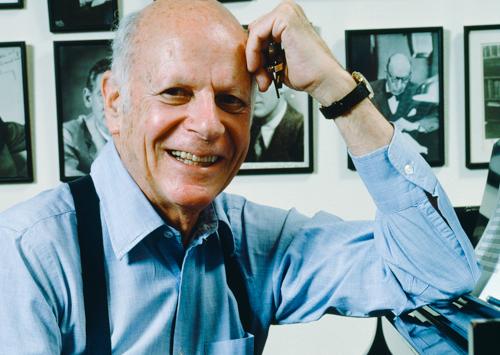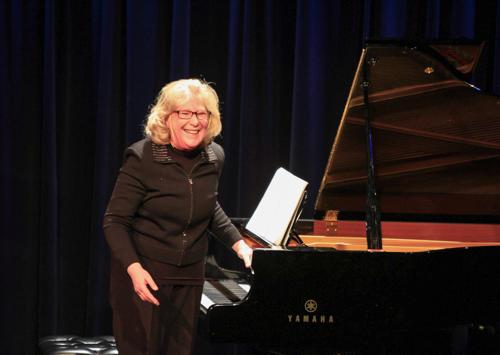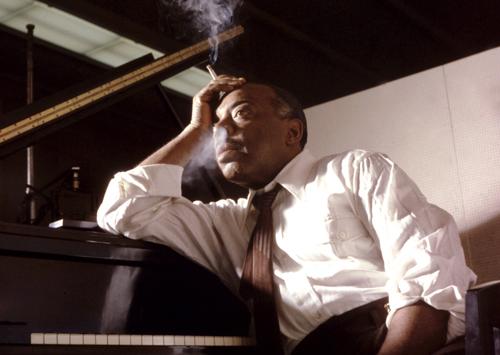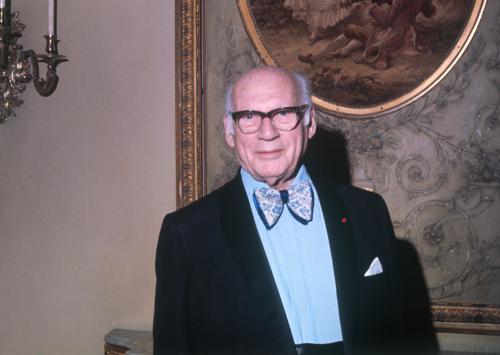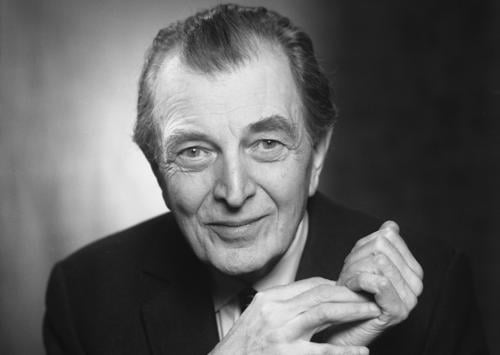Listen to New Voices on Studs Terkel our partnership with 826CHI-here! Read the Story
Showing 1 - 15 of 84 results
-
William Schuman discusses his career as a composer
Apr. 10, 1986 American composer William Schuman discusses his career as a composer and music educator at the Juilliard School.
-
William Ferris discusses intricacies between musical techniques and cultures
Feb. 13, 1990 Music director William Ferris explains various vocal techniques displayed during concerts from the William Ferris Chorale.
-
William Ferris discusses instruments in the William Ferris Chorale
Dec. 15, 1989 Music director William Ferris discusses the singers and music of the William Ferris Chorale. Ferris provides insight on the types of instruments used by the chorale and shares origins about them. He also touches on adopted vocal styles and techniques.
-
William Ferris and John Vorrasi discuss their past and present concerts
Dec. 7, 1993 Interviewing William Ferris, contemporary composer and conductor, and John Vorrasi, lead tenor, as they discuss the beginning and successes of their group called the William Ferris Chorale.
-
Virgil Thomson discusses his career as a music composer for opera and film
Jul. 24, 1973 Studs interview with Virgil Thomson about his career as a music composer. Thomson shares his work with Gertrude Stein in operas "Mother of Us All" and "Four Saints In Three Acts." He discusses his preference for black artists. Thomson describes his work in documentary films such as "Plow That Broke the Plains." He also shares information about the cajun music "Squeeze Box" in the film "Louisiana Story." This edited version does not include the music pieces.
-
Ursula Oppens discusses her career and contemporary piano music
Jan. 9, 1994 Ursula Oppens and Studs discuss contemporary avant-garde piano. Oppens performs pieces from contemporary composers.
-
Thomas Wikman discusses Music of the Baroque
Apr. 22, 1976 Thomas Wikman discusses Music of the Baroque with Studs Terkel. They also discuss composers, musical talent in Chicago, musical instruments, opera, and the history of Baroque music.
-
Terkel comments and presents 1968 Democratic Convention documentary
1968 Terkel comments and presents 1968 Democratic Convention documentary. He is introduced by William F. Malloch, a composer at the Convention.
-
Studs Terkel and William (Bill) Leonard discuss their favorite memories of Frank Holzfeind and the Blue Note Jazz Club in Chicago
Jan. 9, 1975 Studs Terkel and William (Bill) Leonard share memories of the Blue Note Jazz Club as a tribute to Frank Holzfeind. Music is played throughout the episode: "After You've Gone" by the Benny Goodman Sextet, "The Flat Feet Floogie" by Slim and Slam, "How High the Moon" by Sarah Vaughan, "Destination K.C." by Count Basie, "West End Blues" by Louis Armstrong, "Lil' Augie Is A Natural One Man" by Chet Roble, and "Rock Skippin' at the Blue Note", Duke Ellington. Songs have been removed for copyright reasons.
-
Sol Hurok discusses his career as an American impresario
May. 4, 1971 Sol Hurok discusses his work as an impresario, organizing events and bringing artists from around the world to the United States to perform. Studs Terkel plays songs by many of the artists and performers that Hurok has managed during the interview, including Feodor Chaliapin, Nellie Melba, Titta Ruffo, Luisa Tetrazzini, Sviatoslav Richter, Marian Anderson, and Arthur Rubinstein. Music has been removed from this version for copyright reasons.
-
Skip Kennon and David Rounds discuss the play "Herringbone"
Oct. 21, 1981 Skip Kennon wrote the music for "Herringbone", a one-man musical where all ten parts are played by the actor David Rounds. Madness, depression and schizophrenia are discussed as possible themes of the play.
-
Sir Georg Solti talks with Studs Terkel
Feb. 1, 1995 Studs engages the former Chicago Symphony Orchestra conductor, Sir Georg Solti, in a wide-ranging conversation about his life and career. From his early studies in Budapest with Béla Bartók, his string of good-luck opportunities before, during, and after World War II, meeting Toscanini in Lucerne, and starting on top conducting in Frankfurt, London, and finally Chicago. He discusses his many German and European musical influences and contemporaries, and stresses the importance of education, arts funding, and hard work.
-
Singer-songwriters Florence Reece and Pete Seeger discuss writing songs
Mar. 17, 1978 Known for their songs about the working class, both Florence Reece and Pete Seeger talk about how they come about writing the lyrics to songs. Seeger says unbeknownst to them, anyone can write a song. Included within this interview, Seeger plays the banjo and Reece sings a song.
-
Russian-born composer Alexander Tcherepnin talks with Studs Terkel
Apr. 13, 1965 Studs Terkel and Tcherepnin discuss Tcherepnin's early years in Leningrad, his creative drive and its relation to real-life experiences and the influence of Chicago on his 1953 Op. 87 Suite for Orchestra.


